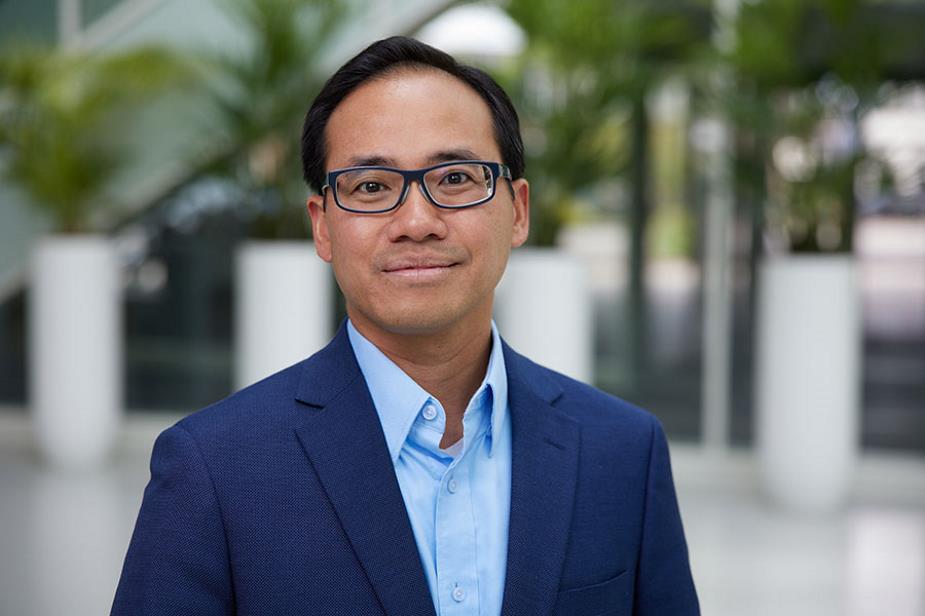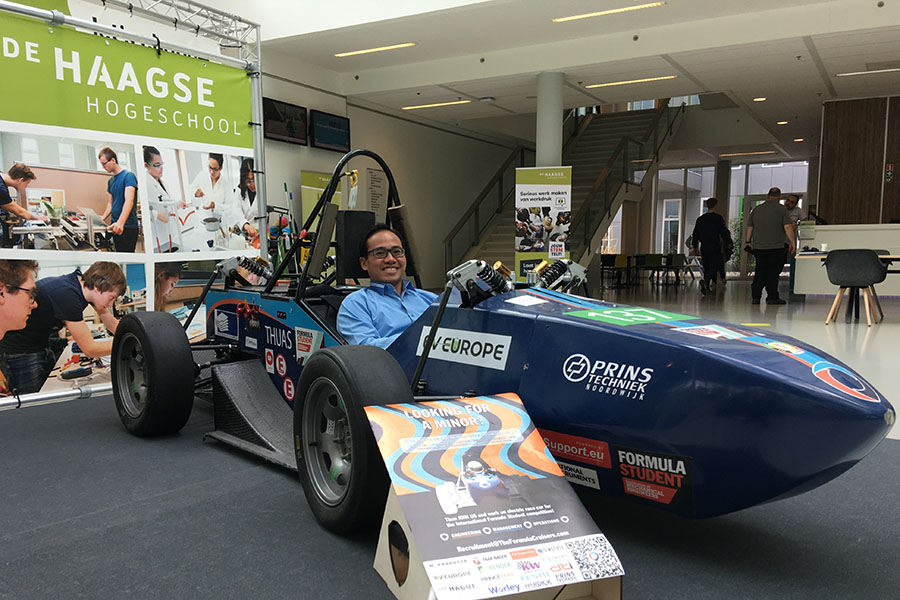Research Group Future Urban Systems: from an egg to a vision
20 June 2022
The Research Group Future Urban Systems has a newly appointed professor: Dr. Rizal Sebastian.

The Research Group Future Urban Systems has a newly appointed professor: Dr. Rizal Sebastian. Having studied architecture, building technology and project management, Rizal has built knowledge, practical experience, and an international network in the area of digital technologies for the improvement of construction quality and processes in the last 23 years. What he wants to achieve with the research group? Let’s begin by formulating a vision together. Using an egg to guide the dialogues.
Building on a solid foundation
The Research Group Future Urban Systems (FUS) contributes to resilient, climate-neutral and smart cities, that’s for sure! The challenge lies in consolidating practical innovations and implementing them in an integrated way. Rizal: ‘My predecessor, Dr. Karel Mulder and his team laid a solid foundation for the Research Group with the focus on urban metabolism, that comprises the complex systems that keep a city alive. Now it’s time for the Research Group to focus on actual challenges in which digitalisation plays a prominent role as enabler of technical and social innovations in the urban environment.’
‘The egg of FUS’
Cities face very complex challenges. The exact projects on which the Research Group FUS will be working are part of the development of a common vision, which is still ongoing. Rizal likes to build the vision through a communal process, involving his research group and lecturers of the Built Environment programme, as well as local governments and companies that collaborate with The Hague University of Applied Sciences. During these conversations, Rizal – using an egg as a metaphor – follows in the footsteps of Columbus, who showed that a solution can be very simple once you have discovered it. We are now awaiting the moment Rizal places ‘the egg of FUS’ on the table.
Yellow and white, stronger together
The egg is a symbol of something more. When you cut it in half, you’ll see yellow and white parts. Yellow is the core, surrounded by white. The growth is in the yolk, but without the protein in the white part, the yolk will not develop. Through this metaphorical egg, Rizal invites his dialogue partners to come up with an answer to the following questions: where should the core expertise of Research Group FUS lie, and how can we collaborate with the education programmes and other research groups to ensure a synergy needed for tackling the urban challenges?
Collaboration with other research groups
Rizal plans to benefit optimally from the collaboration with other research groups within the Centre of Expertise Mission Zero. ‘It’s wonderful that an infrastructure for joint research already exists, and that, at the same time, there remains a lot of freedom for creativity.’ Collaboration is not only nice, it is also logical. The context of Research Group FUS – the urban environment – is, after all, the problem owner and the playing field for innovations in energy transition and circular economy that are developed by the other research groups.
We are making resilient, people-centric and climate-neutral cities where the citizens lead a happy and healthy life. Digitalisation helps us to get there
Three lines of research
Although the exact definition has not yet been established, the dialogues have led to a focus. The long-term goal: resilient, people-centric and climate-neutral cities. With happy and healthy citizens, of course. In this context, three lines of research are being elaborated within the Research Group FUS, namely: 1) support systems for implementing energy transition at the district and urban scale, 2) climate adaptation for cities, and 3) a circular approach towards emission-neutral buildings, infrastructures and urban areas.
Making a greater impact together
‘I am really looking forward to creating coherence between research and education. Together, we can make a greater impact on cities in our region, in the Netherlands and in Europe, after all,’ says Rizal, ‘I very much enjoy transferring new knowledge acquired through research to lecturers and students. In this way, our knowledge will eventually make its way to the industry.’ Teaching is an endeavour he has an affinity with anyway. Rizal is a guest professor at the University of Ferrara (Italy). He has also given guest lectures at the Amsterdam School of Real Estate, TU Delft and TU Eindhoven.
Collaborating with the national government
In his capacity as a professor, Rizal also works for the Netherlands Enterprise Agency (RVO): ‘I advise the RVO on the programmatic approach to digitalisation for accelerating the sustainable transformation of the built environment. The RVO is an agency of the Ministry of Economic Affairs and Climate Policy that works on behalf of various ministries, including the Ministry of the Interior and Kingdom Relations regarding the built environment. Applied research and education are needed to support the government policy and help preparing the industry for the future. This task can be taken on by The Hague University of Applied Sciences where my research group can develop and valorise the knowledge.’
A city is not a city without the people. You can’t separate the built environment from the social environment
Curiosity and thinking big
Where does Rizal draw his inspiration from? First and foremost, from embracing the interconnection between the built environment and the social environment, which is a principle that characterises The Hague University of Applied Sciences. Teamwork with experts and end-users energises him, especially in interdisciplinary research consortia, like in the European research projects in which he has many years of experience. Reinventing the wheel is not his preference. Curious as he is, he finds out what others have invented, so he can acknowledge it and build upon it.

Applying sustainable principles on a large scale
Wouldn’t it be amazing, for example, if the principles from biology, chemistry, and physics would be used to achieve circular (re)development of buildings and infrastructure? And maybe that approach could be scaled up to districts and cities using digitalisation. Rizal: ‘Who knows, it can help us in solving the problems of heat islands and emission in the cities.’
Nice working environment
In the four weeks Rizal has been at The Hague University of Applied Sciences, he has been positively surprised by the informal way of collaborating: ‘Professors, lecturers, student assistants, and graduating students all sit together in large areas with flexible workspaces. I saw lecturers teach and support their students in an informal, fun way. The campuses are designed beautifully, and the lab facilities are well-maintained. In short, it is a nice working environment in which I like to spend my time!’
Inviting people to share ideas
Reflecting on the formation of the research vision, Rizal notes again that a vision isn’t a good vision until it is accepted and shared. He intentionally invites every person who has ideas regarding the future of cities to contact him, and to help shape the vision. So … are you curious to find out more about ‘the egg of FUS’? Send a message via LinkedIn, send an email to [email protected] , or tap Rizal on his shoulder sometime.
Read more about the Research Group Future Urban Systems at The Hague University of Applied Sciences